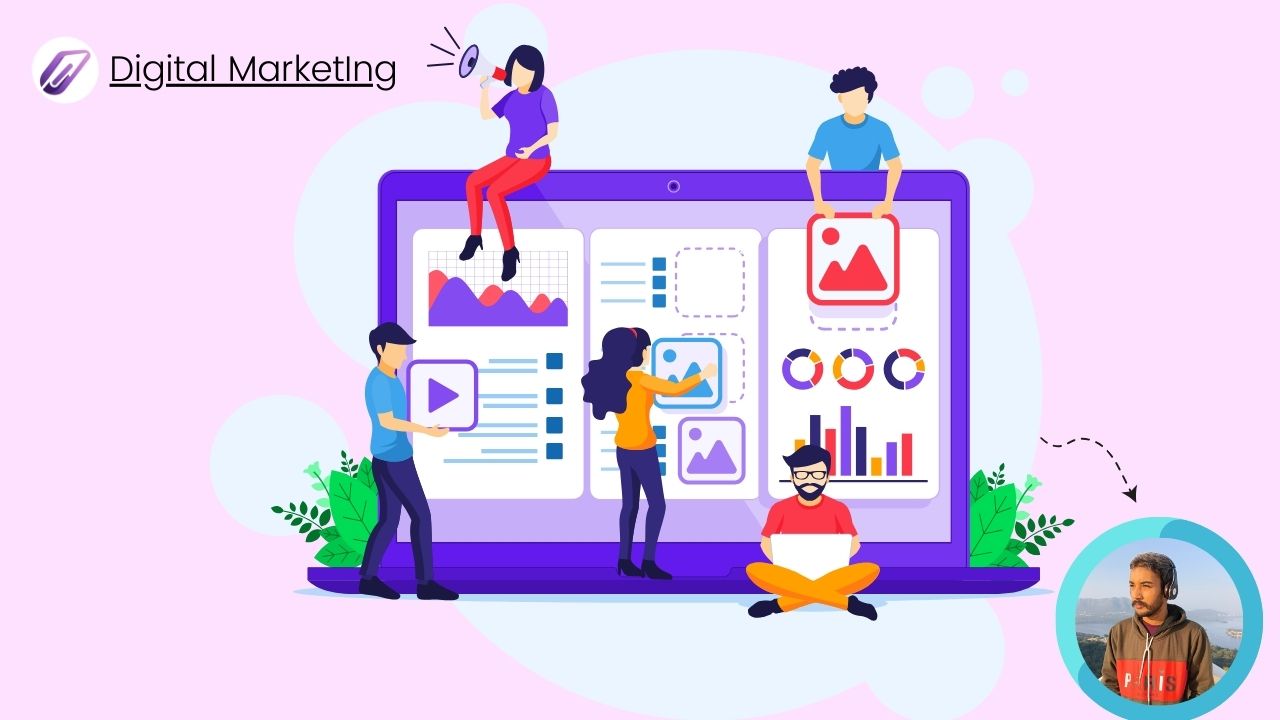Become a Google Digital Marketing Expert in Just 7 Steps!

Learn how to become a Google Digital Marketing Expert in just 7 simple steps! This comprehensive guide will walk you through the process, from mastering the basics to advanced strategies, empowering you to excel in the digital marketing world.
Introduction
Today, among Google’s digital marketing platforms, Google stands out as a powerhouse. It offers many tools and platforms to promote businesses and achieve success online. Becoming a Google Digital Marketing Expert can significantly enhance your career prospects and business growth. In this article, we will guide you through seven essential steps to transform from a beginner to a Google Digital Marketing expert!
Table of Contents
Step 1: Understanding the Basics of Digital Marketing

What is Digital Marketing or google digital marketing?
Digital marketing means using the internet to do marketing. It includes things like search engines, social media, email, and websites to connect with possible customers and engage with them.
Why Google is Important in Digital Marketing?
Google has the most significant share of the search engine market, so it’s crucial for marketers to understand how its algorithms and ranking factors work. Having a strong presence on Google can really help increase brand visibility and generate leads.
Step 2: Mastering Google Search Engine

What is SEO?
Search Engine Optimization (SEO) is like the base of digital marketing. It helps make your website more visible in search results, so more people can find it easily. By using the right words, creating good content, and getting important links, businesses can get more visitors to their website and gain trust online.
The Fundamentals of Google Search
Understanding how Google Search works, including crawling, indexing, and ranking, is fundamental. Researching and implementing relevant keywords are essential to ensure your content appears in relevant search results.
Effective Keyword Research
Keyword research involves identifying the search terms users enter into Google when looking for products or services. Use tools like Google Keyword Planner to discover high-ranking and relevant keywords for your niche.
Optimising Website for Google Search
On-page optimization, such as title tags, meta descriptions, and content structure, helps Google understand your website’s relevance, leading to improved organic rankings.
Step 3: Embracing Google Ads

Introduction to Google Ads
Google Ads is a digital advertising platform that enables businesses to showcase their ads on the search results pages of Google. Understanding its various features and ad formats is crucial for successful campaigns.
Creating Successful Ad Campaigns
Craft compelling ad copy and design eye-catching visuals to attract clicks and drive traffic to your website. Monitor ad performance regularly and make data-driven optimizations to achieve better results.
Budget Management and Optimization
Allocate your ad budget strategically, focusing on high-performing campaigns. Continuously analyse and adjust bids, keywords, and targeting settings to maximise return on investment (ROI).
Step 4: Harnessing the Power of Google Analytics

Understanding Google Analytics
Google Analytics provides valuable insights into website traffic and user behaviour. Learn how to navigate the platform and extract data to make informed marketing decisions.
Data is like the energy that powers successful digital marketing campaigns. When businesses look at how people behave online, the numbers they get, and how many people actually become customers, they can learn important things about what their customers like and then make their marketing even better.
Analysing Website Traffic and User Behavior
The people who visit your website, you measure things like how many visitors you have, their age group, and what they do on your site. This helps you understand your audience better, so you can make your marketing better and more suitable for them.
Measuring and Improving ROI
Google Analytics helps track conversions and attributing them to specific marketing efforts, enabling you to optimise campaigns for higher ROI.
Step 5: Becoming a Content Marketing Pro

Content Marketing Strategy
Develop a content marketing strategy aligned with your target audience’s needs and preferences. Plan a consistent content calendar to keep your audience engaged.
Creating Engaging and Shareable Content
Produce valuable, informative, and entertaining content that resonates with your audience. Encourage social sharing to expand your reach and brand visibility.
Utilising SEO Techniques in Content
Incorporate SEO best practices into your content creation process, such as using relevant keywords, internal linking, and optimising meta tags.
Step 6: Social Media Mastery

Importance of Social Media in Digital Marketing
Social media platforms offer immense opportunities to connect and engage with your audience. Understand the unique features of each platform to create impactful social media campaigns.
Creating a Strong Social Media Presence
Consistency and authenticity are crucial in building a strong social media presence. Interact with your followers, respond to comments, and address queries promptly.
Engaging with the Audience
Encourage conversations and interactions with your audience through polls, contests, and user-generated content.
Building Strong Customer Relationships
Step 7: Nurturing Leads and Conversions

Understanding Lead Generation
Lead generation strategies like email marketing, gated content, and webinars to capture potential customers’ information.
Effective Lead Nurturing Strategies
Nurture leads through personalised communication and targeted content to move them through the sales funnel.
Conversion Rate Optimization
Optimise your website and landing pages for better conversion rates, ensuring a seamless user experience.
Step 8: Positive and Negative points of google digital marketing

Positive Points of Digital Marketing:
- Wide Reach: Digital marketing helps businesses reach many people worldwide.
- Cost-Effective: It offers affordable advertising options for all budgets.
- Targeted Approach: By targeting specific audiences, it increases the chances of getting more customers.
- Measurable Results: Businesses can use detailed data to see how well their marketing is working.
- Interactivity: Engaging content helps build better relationships with customers.
Negative Points of Digital Marketing:
- Information Overload: There are so many marketing messages that it can be overwhelming.
- Privacy Concerns: Some people worry about their privacy when businesses use their data to target ads.
- Ad Blocking: Many people use ad blockers, so ads may not be seen by everyone.
- Cybersecurity Risks: Being online also means facing the risk of cyber threats.
- Short Attention Spans: People online have short attention spans, making it hard to keep their interest.
Conclusion
Becoming a Google Digital Marketing Expert requires dedication, continuous learning, and the ability to adapt to ever-evolving digital trends. By following the seven steps outlined in this article, you can enhance your digital marketing skills and achieve remarkable results for your business or clients.
Use the power of Google’s tools, keep yourself updated on industry changes, and remember that putting in consistent effort and making decisions based on data will lead you from being a beginner to becoming an expert in digital marketing.
Keep in mind, Google Digital Marketing is a big and always changing area. Enjoy learning and be curious about new chances. If you work hard and do things the right way, you can do really well in the fun world of digital marketing.
FAQs

A. Is it necessary to master all the steps to become a Google Digital Marketing Expert?
- While mastering all the steps will provide a comprehensive skill set, focusing on specific areas can also lead to expertise in that particular domain.
B. Can I become a Google Digital Marketing Expert without any prior experience?
- Yes, with dedication and the right learning resources, anyone can become proficient in Google Digital Marketing.
C. Are Google Ads expensive to use?
- Google Ads can be cost-effective if managed efficiently, allowing you to control your budget and bid strategies.
D. How long does it take to become a Google Digital Marketing Expert?
- The time required varies for each individual, depending on their existing knowledge and learning pace.
E. Is content marketing effective for all businesses?
- Content marketing is a powerful strategy for most businesses as it helps build brand authority and drives organic traffic.

